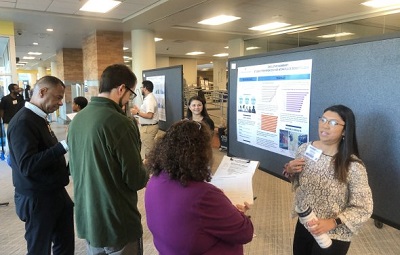Description/Abstract/Artist Statement
Triple negative breast cancer (TNBC) is one of the most aggressive forms of breast cancer, and disproportionately affects African American women. TNBC cells lack the common hormone receptors that many pre-existing cancer treatments target. Fortunately, metal-based complexes with thiosemicarbazone ligands have gained significant attention for their potential as anti-cancer agents. Cobalt(III) complex ([Co(phen)2(MeATSC)](NO3)3•1.5H2O•C2H5OH]) and Copper(II) complex ([Cu(acetylethTSC)Cl]Cl•0.25C2H5OH) specifically have properties of high toxicity, which can contribute to decreased cancer cell activity. The effects of these complexes are currently being investigated on cancerous and non-cancerous breast cell lines. The cytotoxic effect of the cobalt(lll) complex and the copper(ll) complex was analyzed using a CCK-8 viability assay. Further analysis of the activities of caspase 3/7, 9, and 1, cell cycle arrest, and mitochondrial function were conducted to study the cell death mechanisms in the TNBC cell line (MDA-MB-231 VIM RPF). Our findings showed that the cobalt(III) complex induced cell death in the TNBC cell line via activation of oxidative stress, which induced apoptosis and pyroptosis. The cobalt(III) complex also contributed to an increase in ROS levels and mitochondrial dysfunction. The copper(II) complex induced cell cycle arrest in the S phase through the induction of DNA cleavage and induced a significant increase in nicked DNA. Currently, investigations into the cytotoxic effects of both complexes on non-cancerous breast cells are being conducted.
Faculty Advisor/Mentor
Alvin Holder, Stephen Beebe
Faculty Advisor/Mentor Department
Alvin Holder/Department of Chemistry & Biochemistry
College Affiliation
College of Sciences
Presentation Type
Oral Presentation
Disciplines
Biochemistry | Cancer Biology | Molecular Biology
Session Title
College of Sciences 4
Location
Learning Commons @Perry Library, Room 1310
Start Date
3-30-2024 12:00 PM
End Date
3-30-2024 1:00 PM
Upload File
wf_yes
A Comparison of In Vitro Studies Between Cobalt(III) and Copper(II) Complexes with Thiosemicarbazone Ligands to Treat Triple Negative Breast Cancer
Learning Commons @Perry Library, Room 1310
Triple negative breast cancer (TNBC) is one of the most aggressive forms of breast cancer, and disproportionately affects African American women. TNBC cells lack the common hormone receptors that many pre-existing cancer treatments target. Fortunately, metal-based complexes with thiosemicarbazone ligands have gained significant attention for their potential as anti-cancer agents. Cobalt(III) complex ([Co(phen)2(MeATSC)](NO3)3•1.5H2O•C2H5OH]) and Copper(II) complex ([Cu(acetylethTSC)Cl]Cl•0.25C2H5OH) specifically have properties of high toxicity, which can contribute to decreased cancer cell activity. The effects of these complexes are currently being investigated on cancerous and non-cancerous breast cell lines. The cytotoxic effect of the cobalt(lll) complex and the copper(ll) complex was analyzed using a CCK-8 viability assay. Further analysis of the activities of caspase 3/7, 9, and 1, cell cycle arrest, and mitochondrial function were conducted to study the cell death mechanisms in the TNBC cell line (MDA-MB-231 VIM RPF). Our findings showed that the cobalt(III) complex induced cell death in the TNBC cell line via activation of oxidative stress, which induced apoptosis and pyroptosis. The cobalt(III) complex also contributed to an increase in ROS levels and mitochondrial dysfunction. The copper(II) complex induced cell cycle arrest in the S phase through the induction of DNA cleavage and induced a significant increase in nicked DNA. Currently, investigations into the cytotoxic effects of both complexes on non-cancerous breast cells are being conducted.


